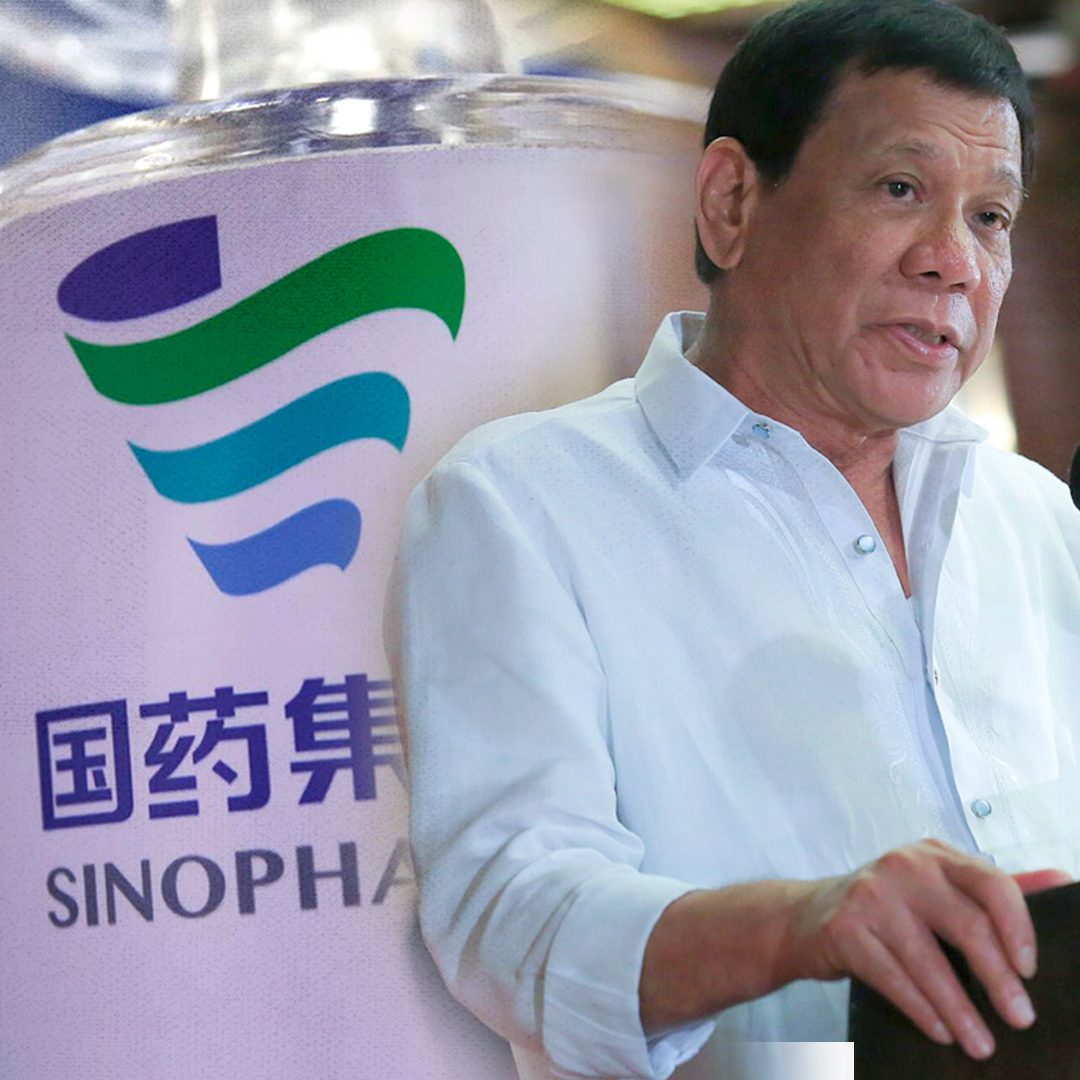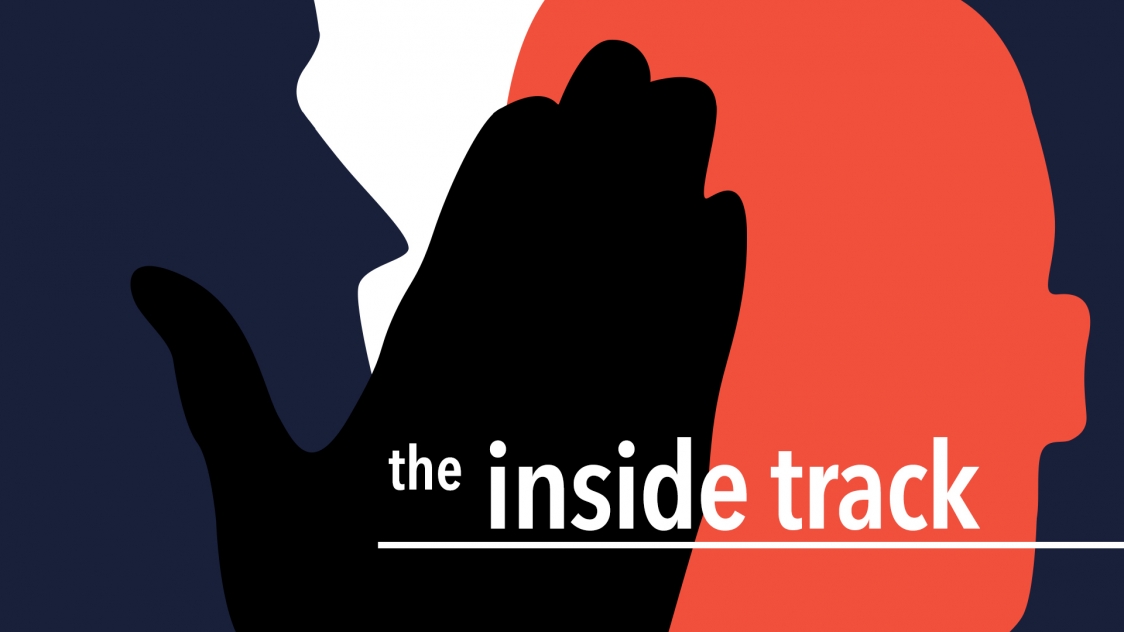SUMMARY
This is AI generated summarization, which may have errors. For context, always refer to the full article.

While the entire country waits for approved COVID-19 vaccines to arrive, one unregistered vaccine is getting a lot of attention: that of Chinese state-owned enterprise Sinopharm.

The biggest news of all came this week when Malacañang said a Sinopharm vaccine is President Rodrigo Duterte’s top choice for protection against COVID-19. Two months ago, his security detail, the Presidential Security Group (PSG), admitted receiving Sinopharm doses, despite lacking the government regulations and approvals.
Other government officials also supposedly got Sinopharm doses, according to Interior Secretary Eduardo Año. The PSG eventually secured a permit to use 10,000 Sinopharm doses, a special permit needed because the Chinese firm has not obtained emergency use approval from the Philippines.
Despite lacking the critical emergency approval, Sinopharm has been linked twice to Malacañang, the highest executive office in the land.
The Sinopharm vaccines are raising eyebrows in more ways.
Sinopharm’s 3 vaccines
Sinopharm, also known as China National Pharmaceutical Group Corp, developed the COVID-19 vaccine most in use in China. It actually has 3 vaccine candidates, but the one approved for general use was the jab developed by the Beijing Institute of Biological Products.
Another vaccine under Sinopharm, developed by its subsidiary Wuhan Institute of Biological Products, also has emergency use authorization (EUA) in China.
A third Sinopharm vaccine candidate uses a technology different from the inactivated virus method of the first two vaccines (and that of Sinovac’s CoronaVac jab) – recombinant protein, said to be easier to produce and more effective. But clinical trials for this are just about to begin.
Because Malacañang and the PSG have been so secretive about their arrangement for Sinopharm vaccines, it’s not clear which jab Duterte prefers and which one was administered to his security aides.
But whichever Sinopharm vaccine it is, any administering of one to Duterte would have to also be covered by a special compassionate permit because Sinopharm has no emergency use approval for any of its vaccines.
In fact, it has yet to even apply for one.
Delays in applying for emergency approval
But back in early January, Sinopharm had plans to apply for an EUA, according to Philippine Ambassador to China Chito Sta Romana.
On January 4, he told reporters that Sinopharm hoped to file “in the next few days” an EUA application.
More than a month later, the biotech firm has yet to make good on the commitment. This is in stark contrast to another Chinese vaccine, CoronaVac developed by private company Sinovac Life Science Company, which secured an EUA on February 22.
This clears the way for 600,000 donated doses of CoronaVac to be shipped to the Philippines. The donation comes from the Chinese government, a goodwill measure after Duterte boasted that he had secured a promise from President Xi Jinping that the Philippines would be a priority vaccine recipient.
But arrangements with the Chinese government have so far not led to an application for emergency use approval from Sinopharm.
Persons claiming to be ‘local representatives’
What further muddles the status of Sinopharm vaccines in the country is how many individuals are claiming to be “local representatives” of the Chinese firm.
This had been raised a few times in hearings conducted by the Senate on the Duterte government’s vaccination plan.
“Ang Sinopharm, ito yung magulo. Hindi natin alam kung sino yung kanilang local representative,” FDA Director General Eric Domingo told senators on February 11.
One such person claiming to be a local representative, Mark Tolentino, incidentally a former transportation assistant secretary fired and publicly castigated by Duterte, even attended a January 22 hearing based on such “credentials.” (Tolentino was sacked from government for dealing with the President’s sister.)
He identified himself as CEO of MKG Universal Drugs Trading Corp, which he claimed, was Sinopharm’s Philippine representative.
Senator Panfilo Lacson asked Tolentino to submit a document confirming that he is recognized by the government or Sinopharm to be the firm’s Philippine representative.
In the same hearing, Jaime Montoya of the Philippine Council for Health Research Development, who is involved in arranging clinical trials, said that two firms sent letters to the Department of Health claiming to be working with Sinopharm on clinical trials.
One firm, “Access International,” sent a letter on October 19. A few days later, on October 23, “Centuria Medical Makati” also sent a letter claiming links with Sinopharm.
Centuria Medical Makati, in an email to Rappler on Wednesday, February 24, confirmed that one of its clinics, Amatus Surgicare Center, did send a letter on Sinopharm clinical trials but clarified that it did “not make any claims of being Sinopharm representatives in the Philippines.”
The clinic only emailed to “signify intent to participate in the Phase 3 Sinopharm clinical trials, which it knows will still go through government processes and approvals.”
A month later, a sitting lawmaker, Pampanga 2nd District Representative Juan Miguel Arroyo emailed the Food and Drug Administration about Sinopharm vaccines. The November 10, 2020 email was empty except for two attachments about Sinopharm, according to FDA Director General Eric Domingo. He confirmed it was indeed the former first gentleman who emailed.
Arroyo, in the email, identified himself as affiliated with LTA Incorporated, which according to Domingo, has not applied to be a distributor or importer of Sinopharm vaccines. LTA Inc was involved in the chopper controversy that led to graft charges against Arroyo in 2012.
Domingo said he told Arroyo to email the vaccine expert panel. The vaccine expert panel, in turn, emailed Arroyo asking what his intent was in sending the vague message. The exchange ended there.
Then on January 1, two individuals claiming to be representatives of MKG Universal Drugs Trading Corp, went on radio to accuse the DOH of not responding to a letter from Sinopharm proposing the conduct of clinical trials in the Philippines, which supposedly led to the firm choosing to conduct trials in the United Arab Emirates instead.
The DOH dismissed the allegations as “baseless” and said the pandemic task force even approved the conduct of Sinopharm clinical trials back in May. When the Department of Science and Technology reached out to the Chinese firm about this, the firm had said the Philippine government would have to foot the bill for the trials. The DOST wrote back, saying the government will only fund trials under the World Health Organization Solidarity Trial.
Tulfo’s Sinopharm link
Then Ramon Tulfo Jr, who had served as Duterte’s special envoy to China, mentioned yet another person claiming to be Sinopharm’s local representative – a certain John Boja.
Tulfo, in his Manila Times column on February 20, claimed he had even gotten Duterte to speak with Boja on the phone since the President was interested in Sinopharm vaccines for him, his family, and even Senator Bong Go.
Tulfo also claimed he himself wants to become a Sinopharm vaccine distributor and so got himself injected with the firm’s vaccine.
But two weeks ago, vaccine czar Carlito Galvez Jr himself said he had confirmed with Sinopharm officials themselves that they have not authorized anyone in the Philippines to speak for them.
“I received a letter from the Sinopharm themselves that they have not authorized any of them… It is written therein that there is no local representative by the Sinopharm considering that Sinopharm is a government-owned institution,” Galvez told senators on February 11.
Domingo confirmed he also received a letter from Sinopharm “saying they do not have a local representative.”
As for Mark Tolentino of MKG Universal Drugs Trading Corp, Galvez said that whatever authority he had to speak on behalf of Sinopharm “expired last March 2020.”
Galvez also said he was told that anyone who wishes to deal with Sinopharm must make arrangements “directly with the government and directly with Sinopharm” since the Chinese consider the vaccine a strategic asset of their government.
All these suspicious claims of “local representatives” makes the PSG even more worthy of scrutiny over who they dealt with to secure Sinopharm injections.
So far, the PSG has not been cooperating with the FDA on providing more information on the source of the vaccines they used.
Duterte himself ordered the PSG not to divulge any information about the arrangement. Even his spokesman, Harry Roque, is kept in the dark about it, left to fend off reporters’ queries without any information.
The Philippine embassy in Beijing, the natural entity to deal with Sinopharm, had no inkling of the donation secured by the PSG.
Two months after Duterte first let the unauthorized vaccinations slip, the public is no closer to knowing who gave the PSG Sinopharm vaccines and how they entered the country without the knowledge of Customs or FDA.
It’s this vaccine – surrounded by mystery and brought in by people Duterte wants to protect – that the President prefers above all others. – Rappler.com
Add a comment
How does this make you feel?

![[The Slingshot] Alden Delvo’s birthday](https://www.rappler.com/tachyon/2024/04/tl-alden-delvo-birthday.jpg?resize=257%2C257&crop=263px%2C0px%2C720px%2C720px)
![[EDITORIAL] Ang low-intensity warfare ni Marcos kung saan attack dog na ang First Lady](https://www.rappler.com/tachyon/2024/04/animated-liza-marcos-sara-duterte-feud-carousel.jpg?resize=257%2C257&crop=294px%2C0px%2C720px%2C720px)
![[Newsstand] Duterte vs Marcos: A rift impossible to bridge, a wound impossible to heal](https://www.rappler.com/tachyon/2024/04/duterte-marcos-rift-apr-20-2024.jpg?resize=257%2C257&crop=278px%2C0px%2C720px%2C720px)

There are no comments yet. Add your comment to start the conversation.